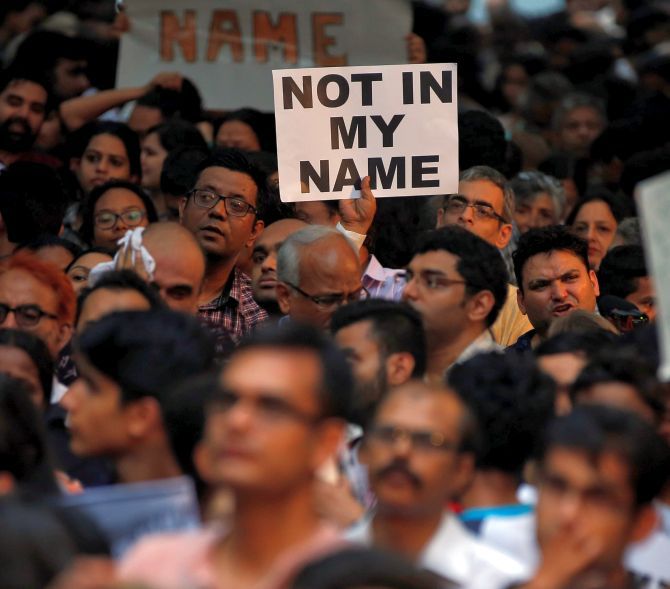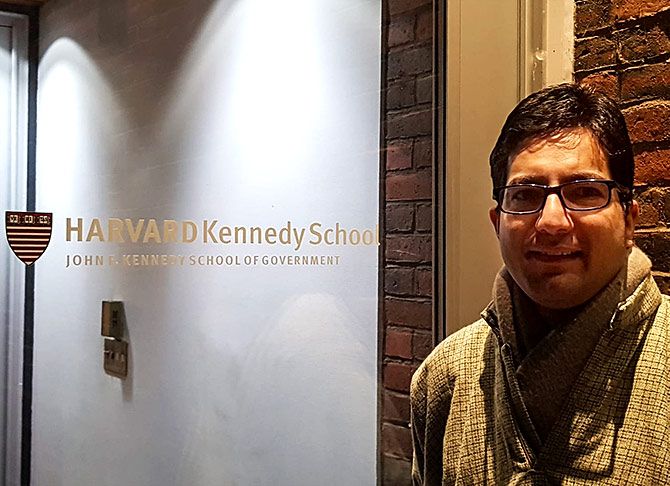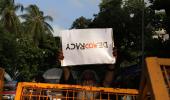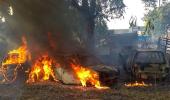'The problem here is not that one community's deity has suddenly become another community's meal.'
'Hindus and Muslims have been peacefully coexisting with their cows for centuries now.'
'The problem here is that a section of Indians has been suddenly made to realise that it makes great political sense to degrade each one of the 170 million Muslims to a potential cow-killer, lynch a few of them to keep the heat on, polarise and win elections.'

Shortly after a mob of gau rakshaks killed police inspector Subodh Kumar Singh in Bulandshahr, Uttar Pradesh, IAS officer Dr Shah Faesal, currently on study leave at Harvard University, tweeted that the Armed Forces Special Powers Act should be implemented in the cow belt for giving security forces a free hand in dealing with gau rakshaks.
"It was a sarcastic comment. AFSPA is a very brutal law and I wouldn't want it to be enforced anywhere. My point was to draw attention towards the urgency of dealing with the cow-vigilant terrorism," Dr Faesal, below, tells Rediff.com's Archana Masih in an e-mail interview from Boston.
Dr Faesal, the first Kashmiri to top the civil services examination in 2010, is the Edward S Mason Fellow at the Harvard Kennedy School.
"Gau-raksha," he says, "is a part of the political project that seeks to use the electoral route for establishment of majoritarian fascism."
Part I of the interview:
The killing of a police inspector by a mob of gau-rakshaks did not involve a poor Muslim accused of cow smuggling but an officer of the law. What has emboldened cow vigilantes that they can kill a law enforcer in cold blood?
It is not about who the gau-rakshaks can kill. It is about the larger message that these incidents are intended to send.
The cow is just a symbol here. Cow protection is just an alibi.
Let's remember that while the lynching is on, India continues to be one of the top-most beef exporters in the world. So, the biggest mistake would be to look at gau-raksha as some sort of a public movement to reorganise India's rural economy around a sacred animal.
The problem here is not that one community's deity has suddenly become another community's meal. Hindus and Muslims have been peacefully coexisting with their cows for centuries now.
The problem here is that a section of Indians has been suddenly made to realise that it makes great political sense to degrade each one of the 170 million Muslims to a potential cow-killer, lynch a few of them to keep the heat on, polarise and win elections.
Gau-raksha is a part of the political project that seeks to use the electoral route for establishment of majoritarian fascism.
Where are we headed if this climate of impunity continues?
We must look at the scale. As I said above, the number of potential victims here is above 170 million. Now imagine a sense of disempowerment and injustice in a community as large as that. That too a community that is living in ghettos, but those ghettos being spread across the country.
It is a simmering discontent. We won't see it immediately. I have not seen any massive mobilisation of Muslims against these lynchings anywhere in the country so far. Because the community is numb. It has not yet figured out how to respond to this challenge.
Being electorally irrelevant, the community might respond in other ways. Not necessarily democratic ones. I dread to think of that scenario.
Since the lynching of Mohammad Akhlaq in Dadri in September 2015, there have been rising incidents of cow related violence against Muslims, what do you see as the biggest reason that there is no end to this vigilantism?
Dadri was a watershed because Mohammad Akhlaq was killed by the mob inside his house, after waking him up, and calling him out on the mere suspicion of having consumed beef.
It brought to the fore the level to which cow vigilantes had been emboldened. But how did the system respond?
The administration asked for testing of the left-over beef. An FIR for alleged cow slaughter was registered against the family. The bereaved family had to face hostilities from the local mobsters leading to their migration from the village.
When the criminal justice system succumbed before vigilantes in Uttar Pradesh, we then had the attack on the Udhampur truck driver; the killing in Bhanukeri, Haryana; hanging of Mazlum Ansari and Imteyaz Khan in Latehar, Jharkhand; and the most brutal mob lynching of Pehlu Khan in Alwar, Rajasthan.
Rather than outrage, we saw a Rajasthan minister praising the killers. We saw the president of the local cow protection gang compare the killers with the revolutionary freedom fighter Bhagat Singh.
Now if the power is with vigilantes, how can justice be with the victims?
Also, if killing a Muslim is seen as a great nationalistic act, why should then this not encourage the depraved elements of a diseased society to seek some immediate glory? It does encourage.
As an upholder of the law yourself, how and why has the police faulted in investigating cow-related crimes?
Has the police and civil administration become increasingly servile to politicians rather than discharging its duty towards the citizen?
The investigation machinery is highly susceptible to outside influence. I have seen the discretion which an SHO enjoys in filing or not filing an FIR, or deciding the sections of the IPC (Indian Penal Code) to be applied, or choosing to arrest or not.
It is a sad reality that the civil and police service in this country is increasingly losing its decision-making autonomy. The Supreme Court directive on police reforms has remained unimplemented so far.
I know it is not very inspiring to see towards our neighbouring country, where the supreme court intervened in the IG Islamabad's illegal transfer case and the minister who had exerted undue influence and interfered with the administration of justice had to resign.
I think the Supreme Court of India will have to do something like that here also.
The UP police seems to have shifted the focus from capturing the accused in the killing of the inspector to finding out the conspirators responsible for the cow slaughter -- isn't this demoralising for those who seek justice?
Now that tells us where the priorities of the investigating agencies are.
It is a morale-booster for the killers that look we are first inquiring into the circumstances of cow-slaughter and then the circumstances of manslaughter.
Imagine the message we are sending to the family of the police officer and the larger victim community.
Imagine the lurking sense of injustice that this is going to create, even if they get some sort of closure one day.
You have said you support the implementation of the Armed Forces Special Powers Act in north India for giving the security forces a free hand in dealing with gau rakshaks.
What makes you say that such a radical and controversial measure is needed?
It was a sarcastic comment. AFSPA is a very brutal law and I wouldn't want it to be enforced anywhere.
My point was to draw attention towards the urgency of dealing with the cow-vigilant terrorism.
Even if we have a special law to deal with the lynching, it will again depend on the field enforcement machinery whether the new law can have impact. So as of now building pressure and generating wider public outrage against the very idea of cow-protection is the only way out.

You also tweeted that some scholars at Harvard asked you about the Bulandshahr lynching, what was your response? How does mobocracy endanger Indian democracy and affect its international reputation?
It is a matter of immense shame that everyone from India must feel embarrassed abroad for the criminal deeds of gau-rakshaks.
India was being seen now as an economic miracle, a growing space power, an aspirational technology giant, contrary to the old reputation of being the country of squatters and snake-charmers.
But this savagery in the name of cow protection is destroying India's image. International students want to talk about it and it is very hard for us here to have conversations over this.
As a young civil servant what are some immediate measures that need to be taken to bolster institutions that directly deal with citizens?
I feel cow vigilantism-related violence has given rise to an extraordinary situation in the country. It is threatening the security and integrity of India.
If we must continue with the IPC, let there be judicial oversight of every such investigation.
The reports of SITs (special investigation teams) that investigated past such murders should be made public.
Civil society should follow up the progress of the trials and build pressure on the investigating agencies to ensure conviction.
More people must speak up and counter the toxic narrative of polarisation.
The vernacular press should rise up to the occasion and educate the masses about the need for communal harmony and freedom of choice.











 © 2025
© 2025